See Care in a New Light
Madonna Rehabilitation Hospitals deliver world-class care at the forefront of rehabilitation science.
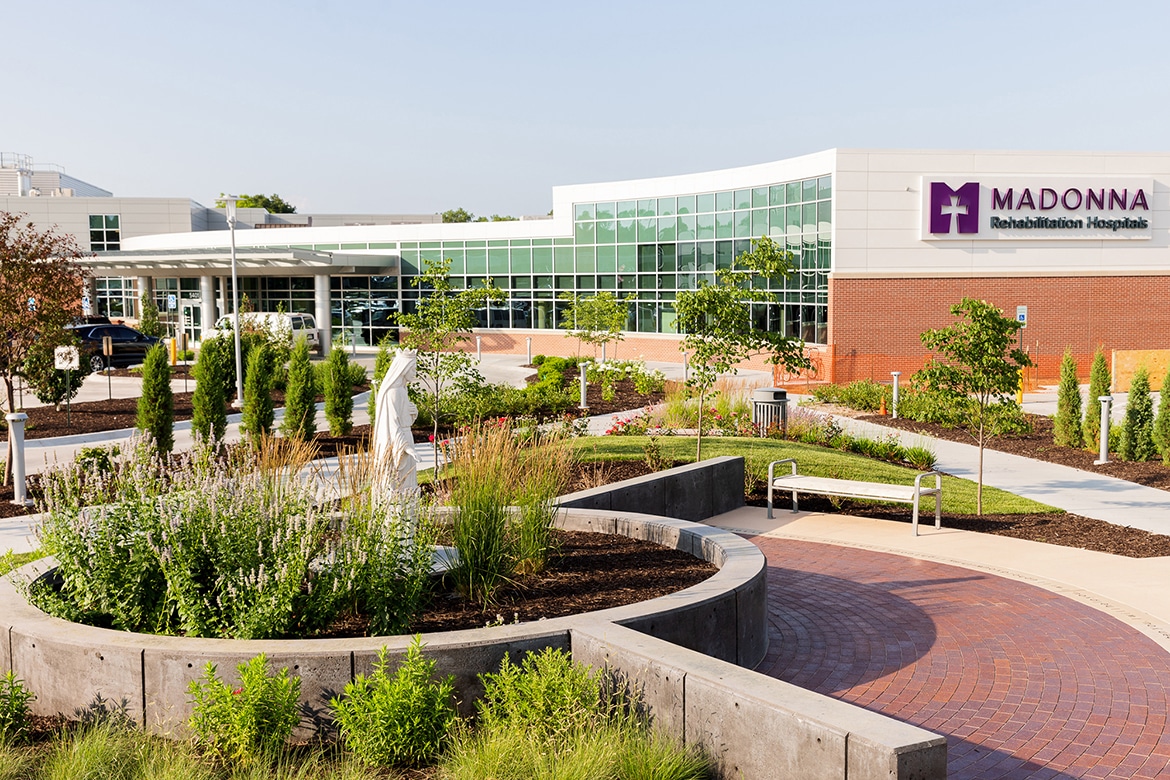
Where Traumas Become Triumphs
See how the very best in physical medicine and rehabilitation bring out your very best.
Tyler Curnes | Neurological Condition

After he was diagnosed with Guillain-Barre syndrome (a rare neurological condition), Tyler’s art career ground to a halt. But with rehabilitation at Madonna, he was back to work in just months. His care team customized his rehabilitation plan and enrolled him in Madonna’s Work Re-Entry program to simulate aspects of his studio work and incorporate specific job skills into his therapy.
“I have a really good (recovery) story because I’m mobile and able to do it all,” Tyler said. “To know that I’m doing this well with three more months of healing helps me know that I’m going to be OK. That’s all thanks to Madonna.”
Skylar McCaulley | Brain Injury
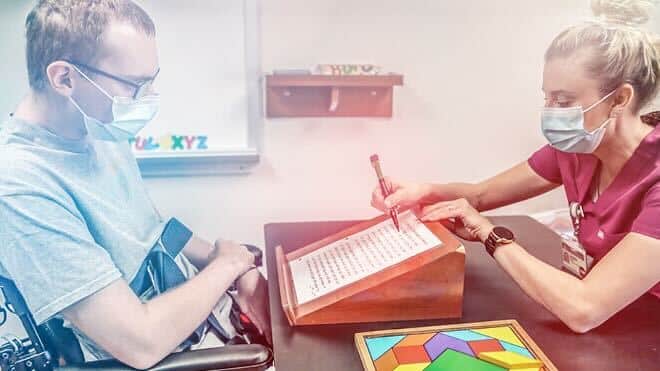
Severe migraines revealed that Skylar experienced a brain bleed. The aspiring doctor spent 51 days in the ICU before coming to Madonna’s brain injury program, arriving unable to move or eat. But his therapy helped him regain his ability to eat, drink and walk with assistance while improving his peripheral vision, reaction time and coordination.
“Skylar has made tremendous progress. When he arrived, he could only nod to answer questions and was getting nutrition through a tube,” said Dr. Matthew Driewer, medical director at Madonna Rehabilitation Specialty Hospital. “Once he was able to start talking, his personality really came out. He’s a smart, determined young man, and that shows every day in his progress.”
Dabi Arnpalli | Neurological Condition
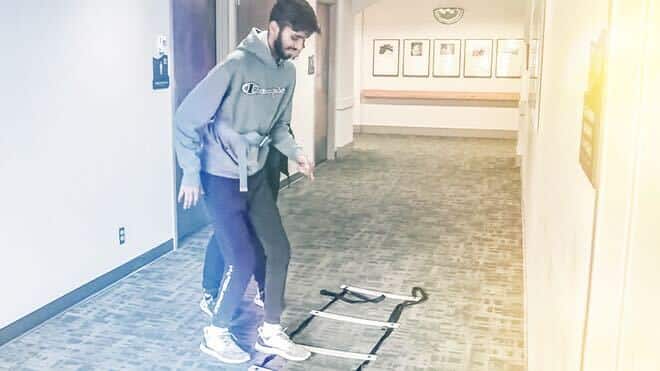
Dabi passed out in his college dorm room and woke up in the hospital eight days later weak, experiencing paralysis and diagnosed with viral meningitis. After six weeks in acute care, he was transferred to Madonna Rehabilitation Hospitals and began to rebuild his leg muscles, coordination and athleticism through an individualized rehabilitation program incorporating his love of sports. Dabi walked out of Madonna and returned to his active life of hiking, cycling and recreational sports.
“I didn’t even think I’d be walking when I got out of here,” Dabi said. “The rehab helped me because it was going from doing exercises to help me regain control of my body again back to doing speed- and agility-type things that I would do in sports.”
Rosie Kubik | Pediatrics
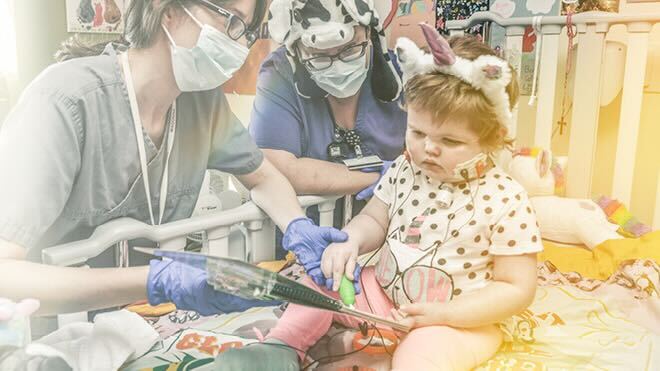
Rosie has spent most of her young life living with illness: She was diagnosed with leukemia at 11 months old. She contracted acute flaccid myelitis (AFM), a rare neurological, polio-like disease at age two. When she experienced respiratory failure, she was admitted to Madonna’s pediatric rehabilitation program and relied on a ventilator. But at Madonna, the toddler relearned to sit, stand, walk and feed herself and only needs breathing support at night.
“She’s starting to take her socks off and feed herself and all kinds of great 2-year-old things,” said Kelly Bolz, Rosie’s occupational therapist at Madonna. “She’s made leaps and bounds.”
Jayslynn Ramirez | Brain Injury

A car accident left Jayslynn with serious brain trauma. The teenager spent four months in Madonna retraining her body through hours of daily physical, occupational and speech therapy. Over time, she began to breathe, talk and walk on her own. Her customized therapy plan helped her relearn skills for her favorite sport (softball) and continue schoolwork in Madonna’s Therapeutic Learning Center.
“She made so much progress while she was here,” said Bridget Mulhall, a Creighton University occupational therapy student who worked with Jayslynn. “Seeing the therapy that we were implementing resonate with her right away—and to have her bring that into not just OT but PT and speech—was amazing.”
Shantel Thompson | Spinal Cord Injury
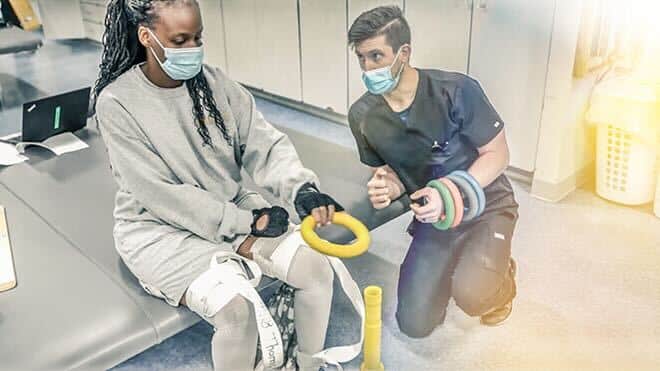
Just days after passing the bar exam, Shantel was involved in a shooting that left her with a spinal cord injury. She was admitted to Madonna’s Spinal Cord Injury Program and her rehabilitation has helped her regain mobility. The aquatic therapy program allowed Shantel to take her first steps since the accident while she strengthened her legs with technology including the Moveo XP and the Functional Electrical Stimulation (FES) bike.
“When I first came from the hospital to Madonna, I couldn’t even sit up by myself,” Shantel said. “Now I look at myself, and I’m doing car transfers and breaking down wheelchairs and getting into the car. I’m maintaining my sitting where I can play catch with my therapists.”
Where Top Medical Minds Lift You Up
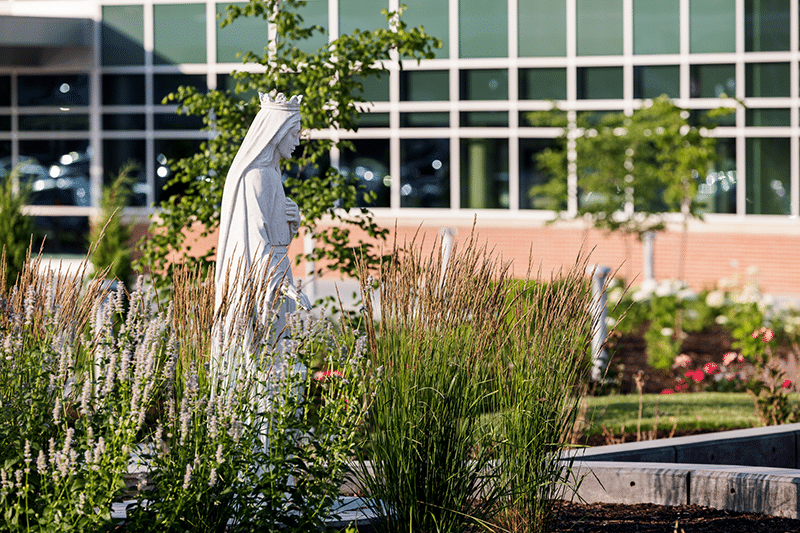
Our Legacy
For more than 60 years, patients and families nationwide have come to Madonna for rehabilitation and renewal built on clinical expertise, pioneering research, state-of-the-art technology, heartfelt patient care and a holistic approach to treatment and therapy.
Our hospitals in Lincoln and Omaha, Nebraska, have strong relationships with acute care partners across the nation, allowing Madonna to provide patients a seamless transition into rehabilitation. Above all, we offer a caring culture where hope outshines all.
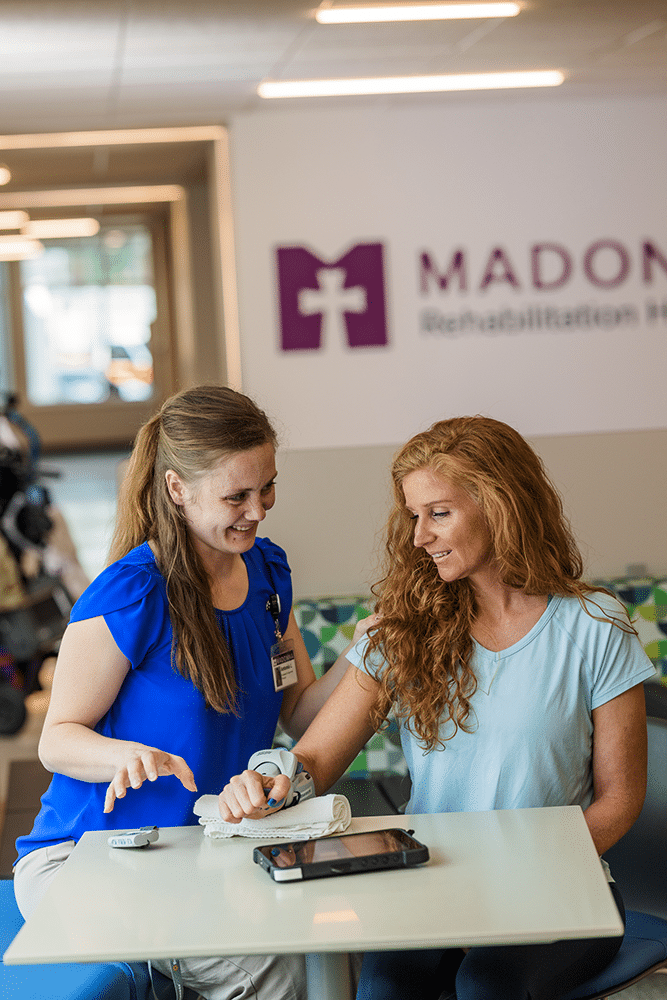
Our Approach
We are relentlessly motivated to help patients regain their highest level of independence through an individualized care plan. Recovery and rehabilitation simulate tasks that mirror patients’ everyday life, from cooking, shopping, driving and on-the-job-functions to the hobbies and activities that give life meaning.
Regardless of the duration of their stay, patients feel comfortable in our hospitals.
-Spacious, private patient rooms and thoughtfully designed rehabilitation spaces.
-A warm, welcoming and supportive community environment.
-Family members are encouraged to participate in therapy sessions and patient care activities when possible.
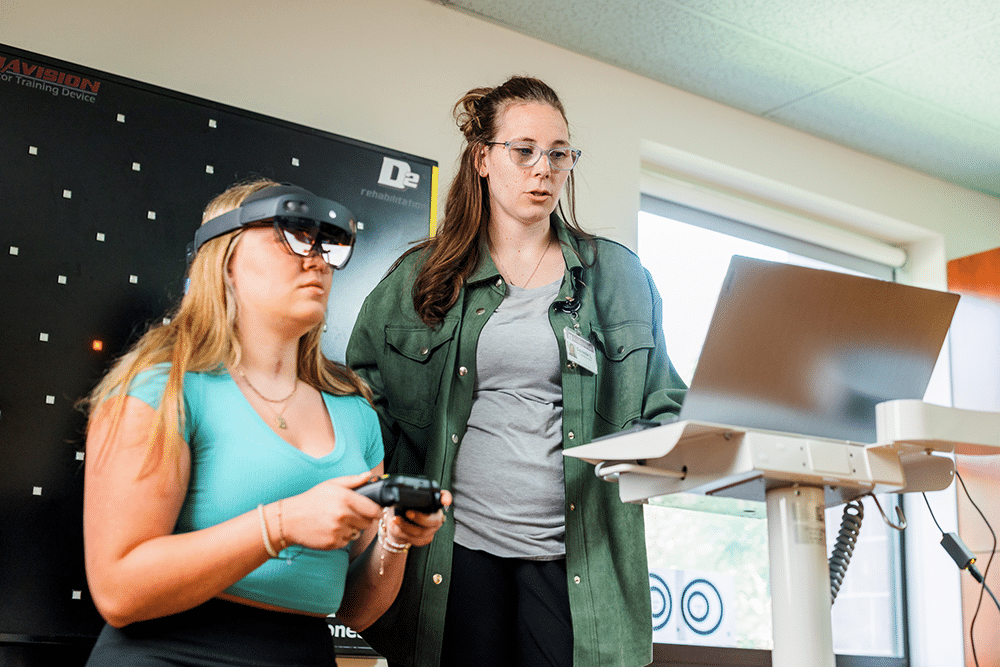
Our Expertise
Patients find renewed strength with the help of dedicated, world-class rehabilitation professionals. Our team includes physicians, rehabilitation nurses, occupational therapists, speech language pathologists, physical therapists, respiratory therapists, counselors, dieticians, pastoral care, case managers and social workers.
With exceptional talent leading the way in physical medicine and rehabilitation science, Madonna helps all patients—even those facing the most complex challenges.
Pediatrics
Our nationally sought-after pediatric program treats patients recovering from brain injury, spinal cord injury, stroke and other complex medical conditions. Age-appropriate and customized therapy programs incorporate family members whenever possible.
Learn More
Stroke
Our stroke program offers a unique and comprehensive program for patients with mild to severe stroke. Multiple levels of inpatient care, as well as outpatient services, allow us to offer each person recovering from stroke the right care at the right time.
Learn More
Spinal Cord Injury
Our spinal cord injury program can help patients return to their life roles regardless of their level of injury. Our program helps patients with spinal cord injury maximize their independence, resolve barriers to returning to their homes and communities and establish lifelong relationships with their rehabilitation teams.
Learn More
Brain Injury
Our brain injury program helps patients move toward lifelong brain health recovery regardless of severity of injury. Madonna is equipped to provide comprehensive inpatient and outpatient programs, including to family and friends also affected by the injury.
Learn More
Complex Medical
Our complex medical program emphasizes the role of rehabilitation in addressing a full spectrum of complex medical diagnoses, including cancer, renal conditions, complex cardiac conditions, post-surgical complications, transplant and neurological conditions.
Learn More
Cancer
Madonna Rehabilitation Hospitals provides both inpatient and outpatient services to address clinical issues such as pain, mobility challenges, fatigue, difficulty with daily self care activities, communication challenges and cognitive or emotional changes. We focus not only on functional gains but also preventative and restorative strategies to help each individual achieve the highest level of independence possible.
Learn More




